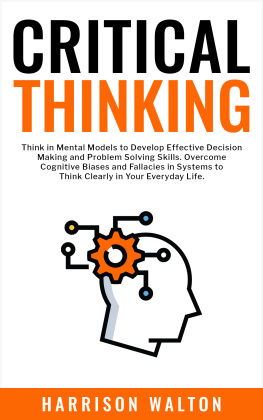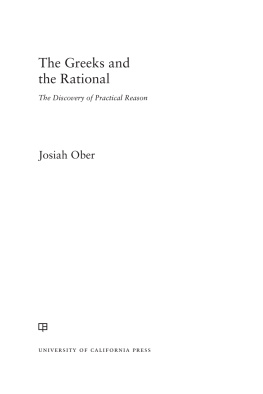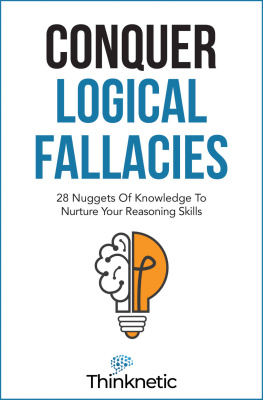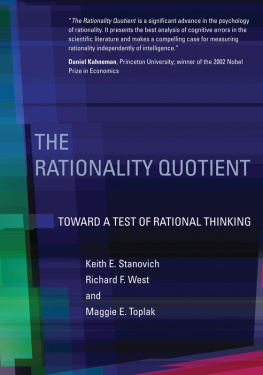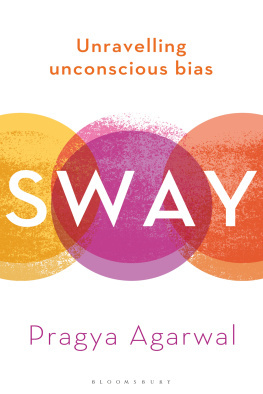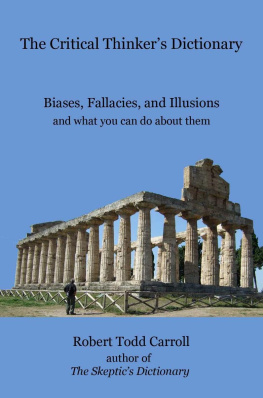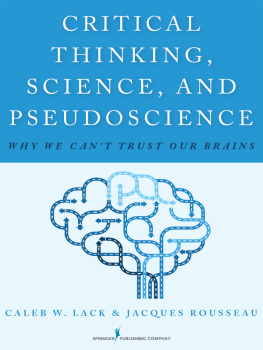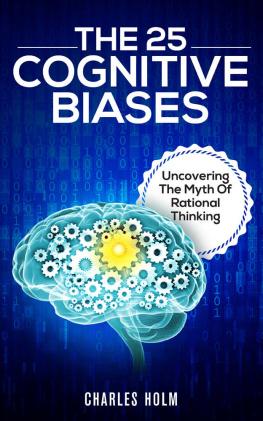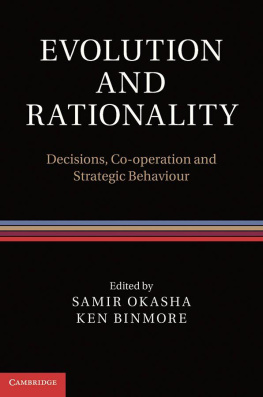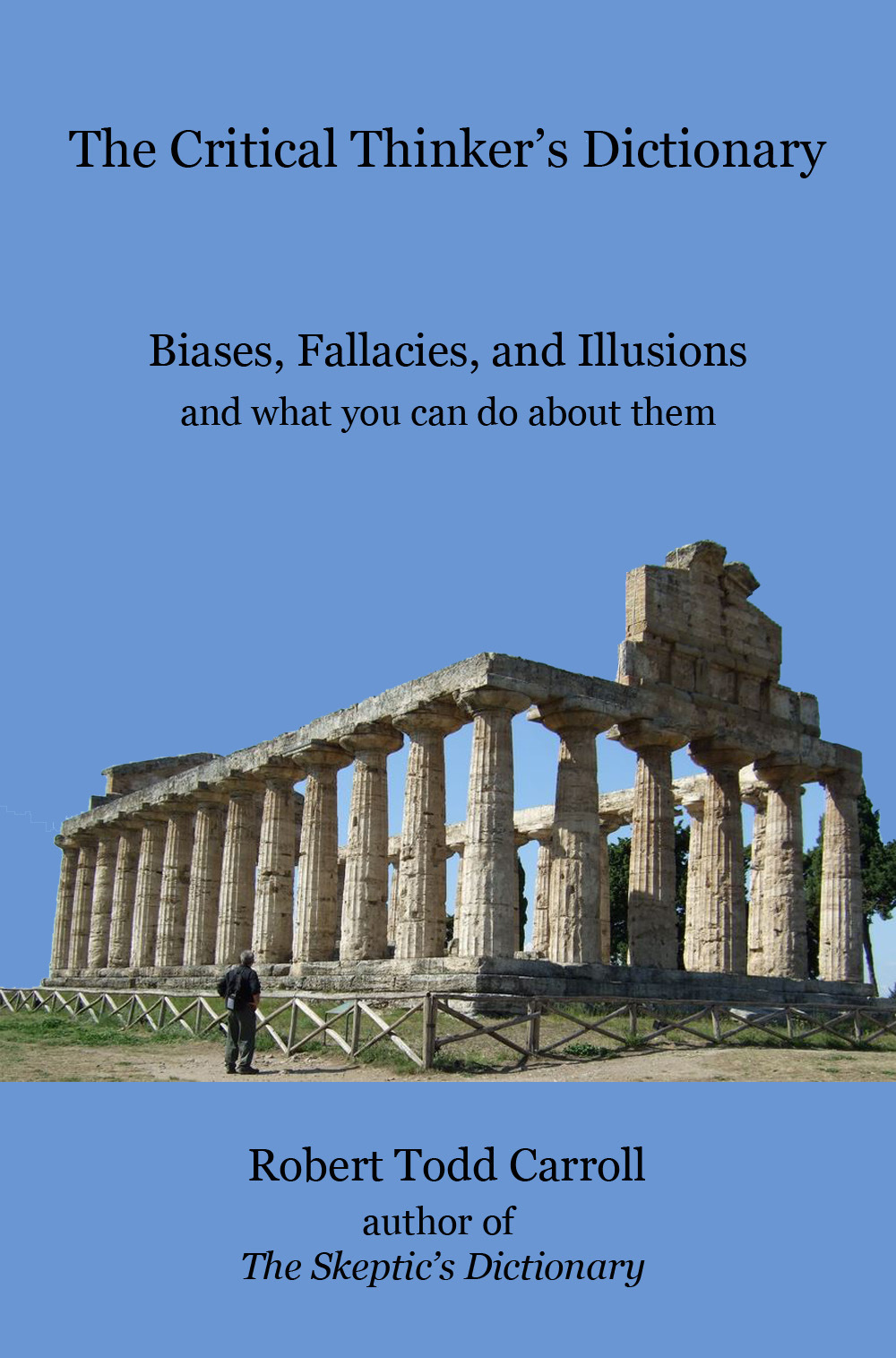The Critical Thinkers Dictionary
Biases, Fallacies, and Illusions
and what you can do about them
Robert Todd Carroll
Copyright 2013 by Robert Todd Carroll
All rights reserved. This book or any portion thereof may not be reproduced or used in any manner whatsoever without the express written permission of the publisher except for the use of brief quotations in a book review or scholarly journal.
First Printing: 2013
www.skepdic.com
Also by Robert Todd Carroll
The Skeptics Dictionary: A Collection of Strange Beliefs, Amusing Deceptions, and Dangerous Delusions
Unnatural Acts: Critical Thinking, Skepticism, and Science Exposed!
Becoming a Critical Thinker: A Guide for the New Millennium
Mysteries and Science: Exploring Aliens, Ghosts, Monsters, the End of the World and Other Weird Things
The Common-Sense Philosophy of Religion of Bishop Edward Stillingfleet 16351699
Reason is, and ought only to be the slave of the passions, and can never pretend to any other office than to serve and obey them. David Hume
Homo rationalis that species of human who carefully weighs all decisions through cold, hard logic and rational analysis of the data is not only extinct but probably never existed. Michael Sherme r
An unbiased appreciation of uncertainty is a cornerstone of rationalitybut it is not what people and organizations want. Daniel Kahneman
Table of Contents
Acknowledgements
I would like to thank the authors cited as sources in this book. I am particularly indebted to the work of Richard H. Popkin, Howard Kahane, Daniel Kahneman, Carl Sagan, Ray Hyman, and James Randi.
I would especially like to thank Harriet Hall for encouraging me to provide a more detailed account of the biases, fallacies, and illusions mentioned in my previous book Unnatural Acts: Critical Thinking, Science, and Skepticism Exposed!
I also want to thank John Renish, whose many suggestions have made this book more readable and less inaccurate. Any errors remaining are my responsibility, of course.
Foreword
The reader will quickly discover that this is no ordinary dictionary. It does provide definitions and examples of usage, but it does not pretend to be neutral or to consider all viewpoints in controversial areas to be equally justified. This is a critical thinkers dictionary, after all. Detailed examples are given that exemplify either high quality or seriously deficient critical thinking. Background information is also provided, which may make the dictionary entries seem more like encyclopedia articles or essays. No subject is considered sacred or off limits. Claims in religion or politics are treated no differently from claims in science or medicine. It is inevitable that most readers will find one of their sacred cows being held up as an example of uncritical thinking. On the other hand, most readers will probably find some delight in seeing ideas or beliefs they reject being exposed as unjustified. The goal of The Critical Thinkers Dictionary is not to offend or to please, however. The goal is to provide a starting point for those interested in what is known about critical thinking and why it is so hard to achieve.
Robert Todd Carroll
Davis, California
November 6, 2013
Preface
The Critical Thinkers Dictionary grew out of a suggestion made by Harriet Hall, M.D., in a review of my book Unnatural Acts: Critical Thinking, Skepticism, and Science Exposed! A guiding principle of that work and this one is that critical thinking does not come naturally. Not only must we work at becoming critical thinkers, doing so goes against our nature. Evolution has provided our species with a magnificent brain, capable of extraordinary things like self-consciousness, memory, facial recognition, and thousands of other miracles. But we evolved to think quickly, a necessity in the environments our species found itself during most of its 100,000-year history. There are times in our modern world where quick thinking is needed, but there are also many times when we should slow things down. Sometimes we are better off if, instead of relying on our instinctive, natural way of thinking about things, we take some time to do some research, to reflect, and to discuss before making a judgment.
Unnatural Acts is an introduction to critical thinking, focusing on the many difficulties we all face in trying to think critically. These difficulties are usually referred to by philosophers and psychologists as biases, fallacies and illusions . In the final chapter of Unnatural Acts , I recommend that the reader develop a plan to study the 59 affective, cognitive, or perceptual biases, fallacies, or illusions that I list there. Dr. Hall argued that providing a list of things to study was insufficient and disappointing. I needed to go into more detail on each of the 59 items on the list. So, I added a short paragraph about each of the 59 biases and fallacies. Why 59? Well, I had to stop somewhere!
After publishing the book, I decided to expand on the short paragraphs and set up a blog where every Monday for 59 weeks I would tackle one of the fallacies, biases, or illusions that hinder our ability to think critically and make good judgments. I called the blog Unnatural Acts That Can Improve Your Thinking . Ive collected those articles, rewrote them, and put them together in alphabetical order to create The Critical Thinkers Dictionary .
In Unnatural Acts I explain why critical thinking does not come naturally to us. Most of our evolutionary history did not require the kind of thinking we call critical thinking. We are not talking about thinking that makes criticisms. That kind of thinking comes all too naturally to us. Were talking about thinking that is reflective and self-conscious , that considers alternatives carefully, and that is more concerned with getting it right than with not getting it wrong. Critical thinking is unnatural. Our natural way of thinking is instinctive and intuitive, often driven by feelings and desires we are unaware of. I view Unnatural Acts as an antidote to Malcolm Gladwells Blink: The Power of Thinking Without Thinking . In Blink , Gladwell argues that intuition or quick judgments can be just as valuable as well thought out and time-consuming evaluations of data. In Unnatural Acts , I try to make the case that while intuition works well enough in many cases, for most important matters there is a much better chance of making a fair and accurate judgment by doing the hard work of collecting, analyzing, and evaluating data in an impersonal, reflective, dispassionate way. Our natural instincts work well enough most of the time, but occasionally we would be better off engaging in the unnatural act of critical thinking.
Introduction
The ancient Greek philosopher Aristotle (384-322 BCE) defined our species as being rational animals , yet he knew as well as we do that we are irrational much of the time. Rationality is an ideal, not a fact. For most of our history, many thinkers have believed that our emotions are the main hindrance to reaching the ideal of rationality. A rational person controls the emotions. An irrational person is controlled by the emotions. Some philosophers disagreed. David Hume (1711-1776), for example, saw the emotions as the only reasonable guide to moral behavior. Evolutionary psychologists would agree based on the fact that though we may consider ourselves the only moral animals , we share an evolutionary history with many animals whose emotional makeup largely resembles our own and which governs their behavior toward one another. Economists, until recently, have clung to the notion of the marketplace being filled with rational animals, animals who may be driven by their desire for pleasure and the avoidance of pain, but who use reason to calculate what is in their best interest and act accordingly.


